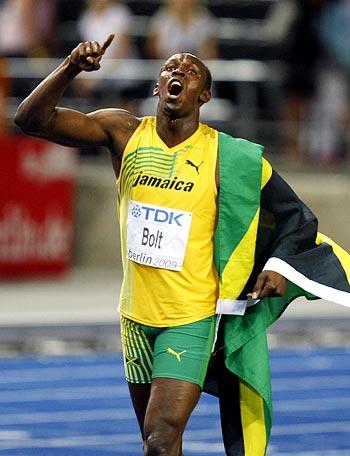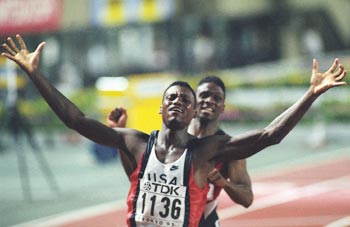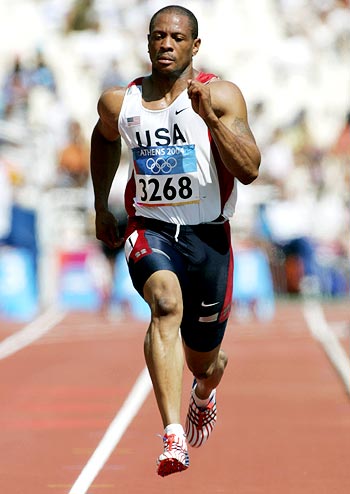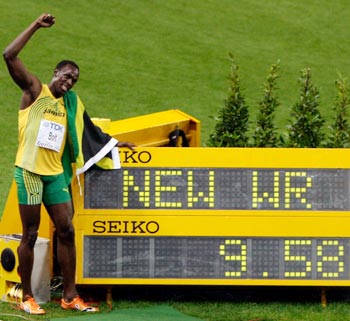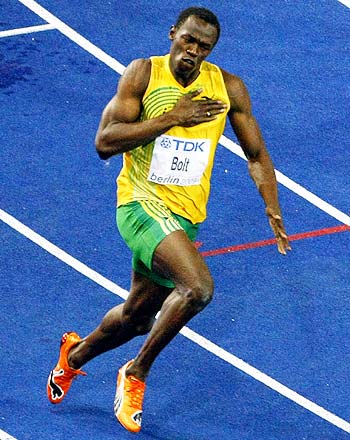 | « Back to article | Print this article |
The 100m runs from 9.9s to 9.58!
From the moment that Usain Bolt danced across the line in the Olympic 100 metres final exactly one year ago and still clocked a massive world record of 9.69 seconds people began asking just how fast he could go.
Scientists used freeze-frame technology to try to extrapolate what his time would have been had he gone hard through the line -- as he did in the 200 metres when he shocked everyone by breaking Michael Johnson's world record over that distance too.
Talk of a 'low 9.6' lifted eyebrows while 9.5-something was surely fantasy.
Not any more.
For decades 10 seconds was the benchmark
For decades 10 seconds was the benchmark for a world class sprinter and only the very best dipped under.
Jim Hines clocked 9.95 at altitude in the Mexico Olympics and that mark lasted 15 years until Calvin Smith ran 9.93.
Only in the late 1980s, initially through the now-expunged times of Ben Johnson and then the likes of Carl Lewis, Leroy Burrell and Donovan Bailey, did it start to edge down regularly, still usually by a 100th at a time.
Greene started the trend
Maurice Greene began the era of chunk-taking when he took five hundredths off Bailey's mark. Asafa Powell continued the trend before Bolt took over.
He took two hundredths off his compatriot's mark in May 2008 with 9.72 then three more in Beijing.
'9.9s' to '9.6s' in exactly 12 months
Then on Sunday, an unbelievable 11 hundredths. After taking 30 years to work its way through the '9.9s' the record has raced through the '9.6s' in exactly 12 months.
Bolt has ripped up the rule book and now no guess is too extreme. "I've said 9.4. I think it will stop at 9.4 but you never know. We'll just keep racing," he said after Sunday's win when asked the inevitable question.
Bolt is a once-in-a-century athlete
Bolt has also changed the template of how a sprinter should look.
Lewis was liquid motion but the best of the rest of the last 40 years have been muscular, powerful athletes, usually well under six feet (1.83metres), who spent as much time in the gym as on the track.
Bolt, at 6ft 5ins (1.95m) is loose limbed and lean and defies gravity the way he gets into his huge stride so quickly.
Advances in track and spike technology, nutrition and scientific training methods have no doubt helped the advance in times but the bottom line is that Bolt is just a once-in-a-century athlete who has earned the admiration and respect of fans and rivals alike.
"I've been telling you someone could run 9.5. I'm happy he did it," said Tyson Gay, whose second-place time of 9.71 was barely noticed despite being the third-fastest ever.
"It showed a human can take it to another level."Powell, third in 9.84, added: "I'm just so excited about Usain's run, I'm stunned but it's great to be a part of this."

© Copyright 2025 Reuters Limited. All rights reserved. Republication or redistribution of Reuters content, including by framing or similar means, is expressly prohibited without the prior written consent of Reuters. Reuters shall not be liable for any errors or delays in the content, or for any actions taken in reliance thereon.
